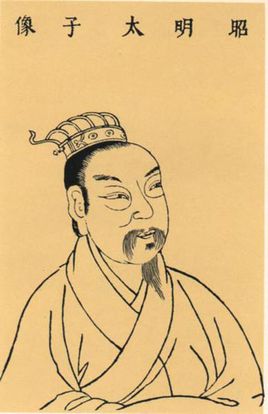Emperor Wu of Liang
| Emperor Wu of Liang | |
|---|---|
| Title | Emperor of Liang Dynasty |
| Reign | 502–549 |
| Coronation | |
| Predecessor | Emperor Shun of Southern Qi |
| Successor | Emperor Jianwen of Liang |
| Spouse | |
| Issue | |
| Full Name | Xiao Yan (蕭衍) |
| House | Liang Dynasty |
| Father | Xiao Shunzhi |
| Mother | Zhang Shangrou |
| Birth Date | 464 |
| Birth Place | |
| Death Date | 549 |
| Death Place | |
| Burial Date | |
| Burial Place | |
Emperor Wu of Liang (Lua error in package.lua at line 80: module 'strict' not found.
- 464–549), personal name Xiao Yan (蕭衍), was the founding emperor of the Liang Dynasty of China. He ruled from 502 to 549 and is known for his significant contributions to the development of Buddhism in China.
Early Life[edit | edit source]
Xiao Yan was born in 464 during the Southern Qi dynasty. He was a member of the Xiao family, which held significant power in the region. His father, Xiao Shunzhi, was a prominent official, and his mother was Zhang Shangrou.
Rise to Power[edit | edit source]
In 502, Xiao Yan led a successful rebellion against the corrupt rule of the Southern Qi dynasty. After overthrowing Emperor Shun of Southern Qi, he declared himself emperor and established the Liang Dynasty. He took the era name "Tianjian" (天監) for his reign.
Reign[edit | edit source]
Emperor Wu's reign is noted for its cultural and religious advancements. He was a devout Buddhist and played a crucial role in the spread of Buddhism in China. He built numerous temples and monasteries and invited many Buddhist monks to his court. His support for Buddhism led to the flourishing of Buddhist art and literature during his reign.
Administrative Reforms[edit | edit source]
Emperor Wu implemented several administrative reforms to strengthen the central government. He reduced the power of the aristocracy and promoted capable officials based on merit rather than birth. These reforms helped to stabilize the government and improve the efficiency of the administration.
Military Campaigns[edit | edit source]
Emperor Wu led several military campaigns to expand and secure the borders of the Liang Dynasty. He successfully defended against invasions from the Northern Wei and expanded the territory of the Liang Dynasty to include parts of modern-day Vietnam.
Death and Legacy[edit | edit source]
Emperor Wu died in 549 during the Hou Jing Rebellion. His death marked the beginning of the decline of the Liang Dynasty. Despite the turmoil that followed, his contributions to Chinese culture and Buddhism left a lasting legacy.
Related Pages[edit | edit source]
Categories[edit | edit source]
Search WikiMD
Ad.Tired of being Overweight? Try W8MD's NYC physician weight loss.
Semaglutide (Ozempic / Wegovy and Tirzepatide (Mounjaro / Zepbound) available. Call 718 946 5500.
Advertise on WikiMD
|
WikiMD's Wellness Encyclopedia |
| Let Food Be Thy Medicine Medicine Thy Food - Hippocrates |
Translate this page: - East Asian
中文,
日本,
한국어,
South Asian
हिन्दी,
தமிழ்,
తెలుగు,
Urdu,
ಕನ್ನಡ,
Southeast Asian
Indonesian,
Vietnamese,
Thai,
မြန်မာဘာသာ,
বাংলা
European
español,
Deutsch,
français,
Greek,
português do Brasil,
polski,
română,
русский,
Nederlands,
norsk,
svenska,
suomi,
Italian
Middle Eastern & African
عربى,
Turkish,
Persian,
Hebrew,
Afrikaans,
isiZulu,
Kiswahili,
Other
Bulgarian,
Hungarian,
Czech,
Swedish,
മലയാളം,
मराठी,
ਪੰਜਾਬੀ,
ગુજરાતી,
Portuguese,
Ukrainian
Medical Disclaimer: WikiMD is not a substitute for professional medical advice. The information on WikiMD is provided as an information resource only, may be incorrect, outdated or misleading, and is not to be used or relied on for any diagnostic or treatment purposes. Please consult your health care provider before making any healthcare decisions or for guidance about a specific medical condition. WikiMD expressly disclaims responsibility, and shall have no liability, for any damages, loss, injury, or liability whatsoever suffered as a result of your reliance on the information contained in this site. By visiting this site you agree to the foregoing terms and conditions, which may from time to time be changed or supplemented by WikiMD. If you do not agree to the foregoing terms and conditions, you should not enter or use this site. See full disclaimer.
Credits:Most images are courtesy of Wikimedia commons, and templates, categories Wikipedia, licensed under CC BY SA or similar.
Contributors: Prab R. Tumpati, MD



